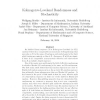87 search results - page 8 / 18 » Random Selection with an Adversarial Majority |
154
click to vote
ALT
2011
Springer
14 years 1 months ago
2011
Springer
We consider the problem of learning sparse parities in the presence of noise. For learning parities on r out of n variables, we give an algorithm that runs in time poly log 1 δ , ...
143
Voted
SP
2005
IEEE
15 years 7 months ago
2005
IEEE
The low-cost, off-the-shelf hardware components in unshielded sensor-network nodes leave them vulnerable to compromise. With little effort, an adversary may capture nodes, analyze...
138
click to vote
EUC
2007
Springer
15 years 8 months ago
2007
Springer
Abstract. Random key pre-distribution schemes are vulnerable to collusion attacks. In this paper, we propose a new key management scheme for ubiquitous heterogeneous sensor network...
STACS
2005
Springer
15 years 7 months ago
2005
Springer
An infinite binary sequence X is Kolmogorov-Loveland (or KL) random if there is no computable non-monotonic betting strategy that succeeds on X in the sense of having an unbounde...
132
click to vote
TCBB
2011
14 years 8 months ago
2011
—In biomedical data, the imbalanced data problem occurs frequently and causes poor prediction performance for minority classes. It is because the trained classifiers are mostly d...

